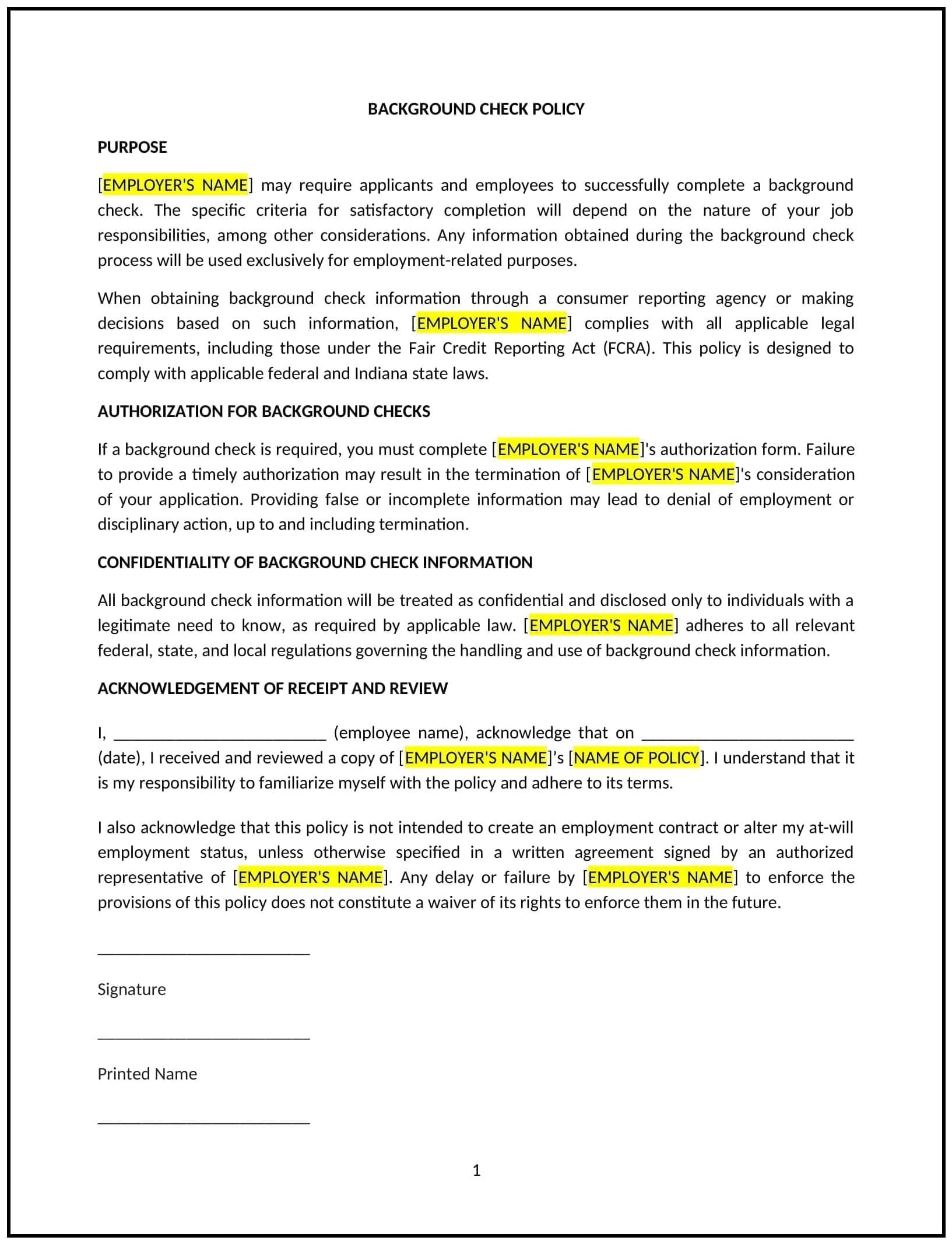Got contracts to review? While you're here for policies, let Cobrief make contract review effortless—start your free review now.

Customize this template for free
Background check policy (Indiana): Free template
The background check policy helps Indiana businesses establish guidelines for conducting background checks on potential employees and, where appropriate, current employees. This policy outlines the types of checks that may be conducted, such as criminal history, employment verification, and credit history, and ensures that these checks are performed in a consistent, lawful, and fair manner. By using this template, businesses can mitigate risks associated with hiring, ensure that employees meet the qualifications required for the role, and maintain a safe and trustworthy work environment.
By implementing this policy, Indiana businesses protect themselves from potential legal and financial risks, ensure they are hiring individuals who meet their standards, and promote fairness and transparency in the hiring process.
How to use this background check policy (Indiana)
- Define the purpose of background checks: Clearly state why background checks are conducted, including protecting the business, ensuring workplace safety, and verifying the qualifications of potential employees.
- Specify the types of checks: Outline the specific background checks that will be conducted. This may include criminal background checks, employment history verification, education verification, credit checks (if relevant to the position), and drug screening.
- Inform candidates: The policy should specify that all candidates will be informed and must consent to the background check. Include information on how candidates will be notified about the process and their rights.
- Comply with legal requirements: Ensure that the background check process adheres to federal and Indiana state laws, including the Fair Credit Reporting Act (FCRA) and the Indiana Consumer Reporting Agencies Act. This includes obtaining consent, maintaining confidentiality, and ensuring the accuracy of information obtained.
- Establish guidelines for handling results: Define how background check results will be evaluated, including the process for assessing criminal history, discrepancies in employment or education history, and other potentially disqualifying factors. The policy should outline what types of issues may result in disqualification from employment.
- Protect candidate privacy: Outline how background check information will be stored securely, and specify that it will only be shared with individuals who have a legitimate need to know.
- Set procedures for addressing adverse findings: Define the process for notifying candidates of any adverse findings, and give them an opportunity to explain or dispute any discrepancies before final decisions are made.
- Align with business needs: Specify that background checks are tailored to the role being filled and explain why certain checks are relevant to specific job functions.
Benefits of using this background check policy (Indiana)
Implementing this policy provides several key benefits for Indiana businesses:
- Enhances workplace safety: Background checks help businesses identify any potential risks associated with hiring a candidate, such as a history of violent behavior or fraud.
- Reduces legal and financial risks: By conducting background checks in compliance with legal regulations, businesses reduce the risk of legal actions or fines related to negligent hiring practices.
- Promotes a fair hiring process: A standardized, transparent process ensures that all candidates are treated equally and that background checks are performed consistently.
- Protects company reputation: Hiring individuals who meet the company’s qualifications and have a clean record helps maintain the company’s reputation and integrity.
- Supports a reliable workforce: Background checks help businesses verify the qualifications of potential employees, ensuring that the workforce is reliable, honest, and trustworthy.
- Improves decision-making: By gathering relevant background information, businesses can make more informed hiring decisions, ultimately improving the quality of hires.
Tips for using this background check policy (Indiana)
- Communicate the policy clearly: Ensure that all candidates are informed about the background check process before any checks are conducted. Include the policy in the recruitment materials and employee handbook, and explain it during the hiring process.
- Obtain consent from candidates: Always obtain written consent from candidates before conducting a background check. Ensure they understand what checks will be performed and their rights under the law.
- Maintain confidentiality: Store background check results securely and limit access to those who need the information for decision-making purposes. Keep all information confidential in line with privacy laws.
- Regularly review the process: Periodically review the background check policy and procedures to ensure they comply with changes in local, state, or federal laws, and ensure that they continue to meet the needs of the business.
- Handle adverse findings carefully: If background check results indicate potential issues, follow the procedures outlined in the policy to give candidates a chance to dispute the findings or provide additional context.